The past three months in Barcelona have been politically heated due to Catalonia’s declaration of independence and the Spanish government’s refusal to recognize it. Instead, under their constitution, the Spanish government dissolved the Catalan parliament and forced new elections, which were won by pro-independence parties. There continues to be a stalemate over the crisis, with the Catalan parliament rejecting a ruling by the Spanish Supreme Court to suspend pro-independence politicians from government positions on October 2, 2018, according to Reuters. For those who want to learn a bit more about the politics involved, here’s a brief guide to the political parties of Catalonia, particularly those that hold seats in Catalonia’s parliament.
Related article: Why Some Catalans Want Independence
Table of Contents
National Parties of Catalonia



Photo by Gabriel Bouys/AFP via Getty Images
These refer to the most common national parties in Madrid as well as in Catalonia’s parliament. First, there is the Spanish Socialist Workers’ Party, the center-left, social democratic party which is the oldest party functioning in Spain and Catalonia. It was founded in 1879, surviving dictatorships, a Civil War, and other conflicts in the country. Current Spanish Prime Minister Pedro Sánchez (right) is a member of the Socialist Workers Party, and in June 2018 ousted former Prime Minister Mariano Rajoy, who held the People’s Party in power in Spain until his fall. The People’s Party is currently the least represented party in the Catalan parliament with just three seats, and is know for its former iron-fisted rule on Catalonia’s push for independence. The party is conservative, pro-monarchy, and pro-union, opposing Catalan’s push for independence.
Next, there is the Spanish Socialist Workers’ Party, the center-left, social democratic party which is the oldest party functioning in Spain and Catalonia. It was founded in 1879, surviving dictatorships, a Civil War, and other conflicts in the country. There are also two parties founded in the last decade. Citizens, a centrist party formed in 2006 and founded in Barcelona, promotes classical liberalism, Pro-Europeanism, and Spanish unionism while strongly opposing Catalan independence. They won the most seats in December’s election with 36 seats in Catalonia’s parliament. Podemos, or “we can” in English, is a left-wing populist party that advocates eco-politics, de-centralization among each region in Spain, and economic reforms that promote a basic income for all citizens, more spending on health care and housing to fight poverty, and tax avoidance laws against big corporations. They only hold eight seats.
Catalan Nationalist Parties
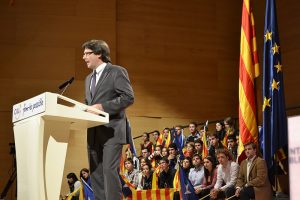


Photo by Convergència Democràtica de Catalunya via Visualhunt
These parties range from center-right to left-wing, all promoting Catalan nationalism and separatism, which has been in conflict recently. First, there is Together for Catalonia. Also known as Junts per Catalunya in Catalan, this party is a coalition of the centrist Catalan European Democratic Party and a group of listed independent politicians. The party is led by Carles Puigdemont, the controversial leader who has been in exile in Belgium to avoid prosecution for holding the illegal referendum. The party currently holds 34 seats, currently the second-highest number in Catalonia’s parliament. Another center-right Catalan nationalist party is the Democrats of Catalonia. Next, there is the Republican Left of Catalonia-Catalonia Yes party, an alliance of parties that are center-left to left-wing, with the Republican Left as the historic Catalan party founded in 1931, the year of Spain’s Second Spanish Republic. Lluís Companys, Catalonia’s last President before the fall of the Republic to Franco’s forces, was a founding member of the party. It currently holds 32 seats, the third-highest number in Catalonia’s parliament.
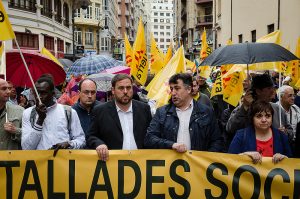


Photo by Marc Sardon via Visual Hunt
The Popular Unity Candidacy–Constituent Call is the most leftist of all parties for its anti-capitalist, nationalist, and anti-EU platform. Only a few years old, they won four seats in last month’s election. They’re a coalition of the PUC and several far-left groups, including communist parties. Its main leaders are former writers, journalists, teachers, doctors, and other professionals making their first move into politics. In between, there are other minor parties that all fit within the Catalonia Yes side of the coalition.
Related article: Banging Pots and Pans for the Referendum
Politics is complicated already, but in Catalonia, it’s a very personal issue between the national parties and locally-based parties in support of Catalan independence. The Catalan flag is waved out of pride, even more highly than the Spanish flag here. The parties are the main players in Catalonia’s parliament and it’s their leaders who control Catalonia’s internal economy and functions that are essential to basic life in Barcelona.
Looking for an apartment in the city? ShBarcelona can help you find the perfect one.









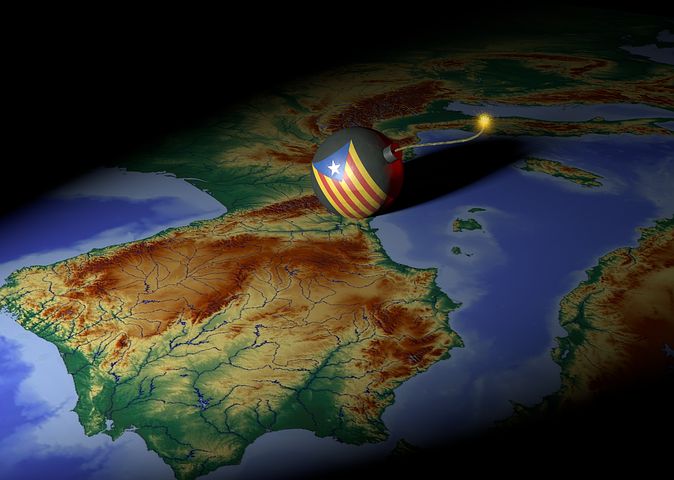



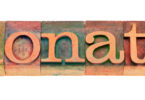

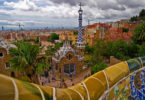
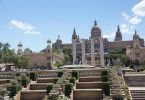

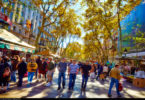

Leave a Comment